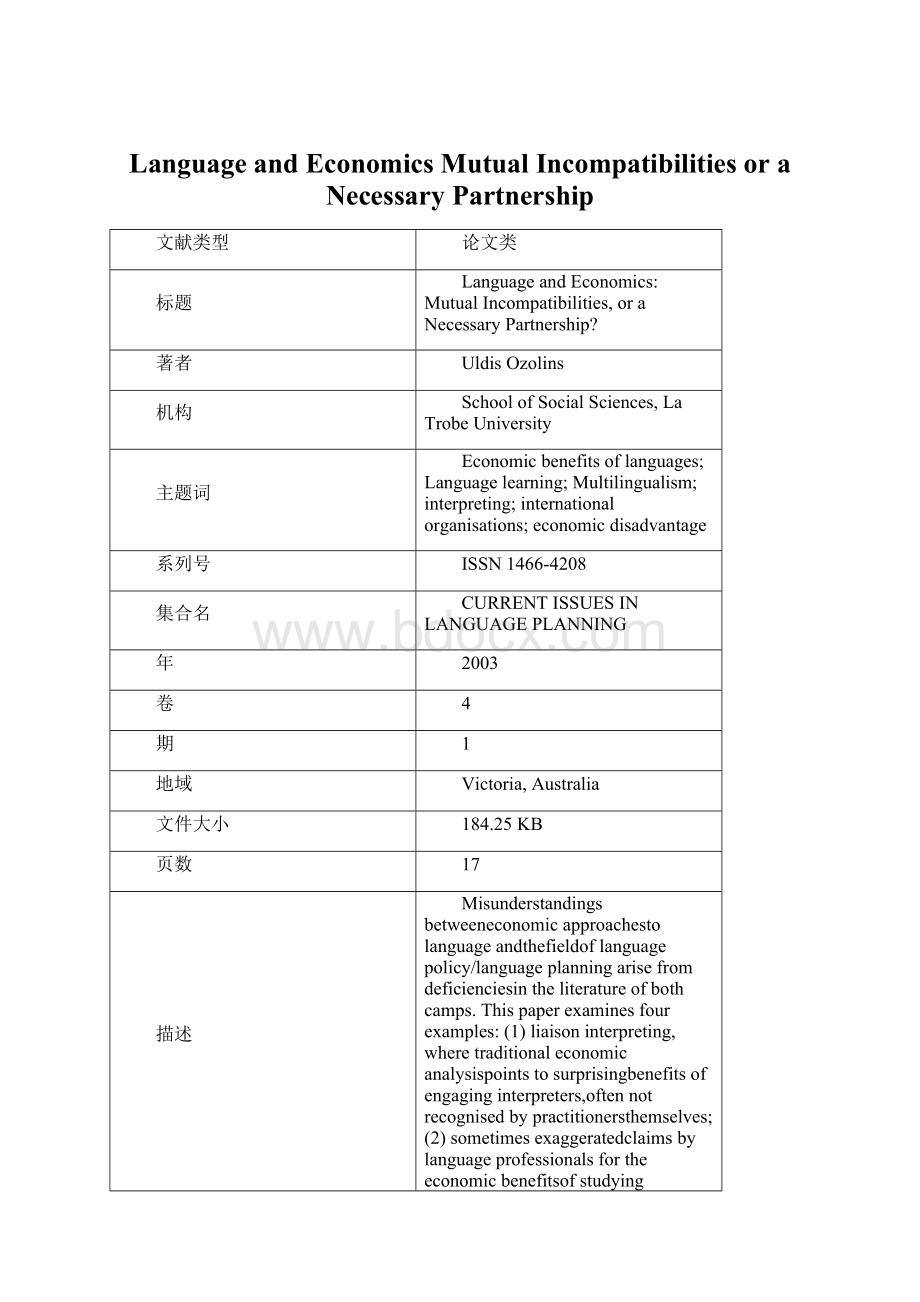Language and Economics Mutual Incompatibilities or a Necessary Partnership.docx
《Language and Economics Mutual Incompatibilities or a Necessary Partnership.docx》由会员分享,可在线阅读,更多相关《Language and Economics Mutual Incompatibilities or a Necessary Partnership.docx(28页珍藏版)》请在冰豆网上搜索。

LanguageandEconomicsMutualIncompatibilitiesoraNecessaryPartnership
文献类型
论文类
标题
LanguageandEconomics:
MutualIncompatibilities,oraNecessaryPartnership?
著者
UldisOzolins
机构
SchoolofSocialSciences,LaTrobeUniversity
主题词
Economicbenefitsoflanguages;Languagelearning;Multilingualism;interpreting;internationalorganisations;economicdisadvantage
系列号
ISSN1466-4208
集合名
CURRENTISSUESINLANGUAGEPLANNING
年
2003
卷
4
期
1
地域
Victoria,Australia
文件大小
184.25KB
页数
17
描述
Misunderstandingsbetweeneconomicapproachestolanguageandthefieldoflanguagepolicy/languageplanningarisefromdeficienciesintheliteratureofbothcamps.Thispaperexaminesfourexamples:
(1)liaisoninterpreting,wheretraditionaleconomicanalysispointstosurprisingbenefitsofengaginginterpreters,oftennotrecognisedbypractitionersthemselves;
(2)sometimesexaggeratedclaimsbylanguageprofessionalsfortheeconomicbenefitsofstudyinglanguages;(3)unresolvedissuesinlanguageuseininternationalorganisationsandtrade;and(4)misinterpretationsoflinksbetweenmultilingualismanddisadvantage.Lackofunderstandingbyeconomistsoflanguageissuesisoftenmatchedbyilliteracyineconomicsonthepartoflanguageprofessionals.
原始链接
UldisOzolins
SchoolofSocialSciences,LaTrobeUniversity,Victoria,Australia
Misunderstandingsbetweeneconomicapproachestolanguageandthefieldoflanguage
policy/languageplanningarisefromdeficienciesintheliteratureofbothcamps.This
paperexaminesfourexamples:
(1)liaisoninterpreting,wheretraditionaleconomic
analysispointstosurprisingbenefitsofengaginginterpreters,oftennotrecognisedby
practitionersthemselves;
(2)sometimesexaggeratedclaimsbylanguageprofessionals
fortheeconomicbenefitsofstudyinglanguages;(3)unresolvedissuesinlanguageuse
ininternationalorganisationsandtrade;and(4)misinterpretationsoflinksbetween
multilingualismanddisadvantage.Lackofunderstandingbyeconomistsoflanguage
issuesisoftenmatchedbyilliteracyineconomicsonthepartoflanguageprofessionals.
Keywords:
Economicbenefitsoflanguages,interpreting,languagelearning,
internationalorganisations,multilingualism,economicdisadvantageIntroduction
FrançoisGrin’spaperinthisvolumeidentifiesseveralcrucialintersections
betweenlanguagesandeconomics,andalertsustoafieldinsufficientlytheo-
risedandinsufficientlyattendedtobylanguageanalystsinperformingrealistic
economiccalculationsoflanguagepolicy.
YetdespitetheeffortsofauthorssuchasGrin,agapstillexistsbetween
economicapproachestolanguageandthefieldoflanguagepolicy/language
planning.Reasonsforthisaremany,withdeficienciestobeobservedinboththe
languagepolicyandtheeconomicliterature.Thispaperlooksbrieflyatfour
examples,where:
(1)economicilliteracyhaspreventedtherecognitionofbene-
fitsthatcanflowinsomelanguageprofessionalfields,takingexamplesfrom
interpreting;
(2)economicjustificationsdominatetherationaleforparticular
languageprogrammesbuttheseprogrammesstruggletorealisetheireconomic
claims,takingexamplesfromprogrammespromotinglanguagestudyfor
economicpurposes;(3)economicissuesinlanguageuseariseininternational
affairs,takingexamplesfrominternationalorganisationsandtheregulationof
trade;(4)speakinganotherlanguageisautomaticallyequatedwitheconomic
disadvantageandanalysedaccordingly,takingexamplesfromeconomicanaly-sesofbenefitsandcostsofmultilingualismandmajority/minoritylanguages.CostsandBenefitsofLanguageServices
Onefieldwhereeconomicbenefitshaveoftennotbeenrecognisedhasbeen
thatofinterpreting,particularlyinrelationtotheworld’smostcommonformof
interpreting–liaisoninterpretinginsituationsofimmigrationorcontactwithindigenousordeafcommunities,wherelanguageminoritypersonsandtheinsti-
tutionsthatservethemneedameansofcommunication.
1
Overthepastfew
decades,socialsystemsaroundtheworldhaveacknowledgedtheneedfor
languageservices,butwhatisconsideredtoconstituteanadequateservice
differswidely,andsuchserviceshaveoftendevelopedhaphazardly.Generally,
thosedesiringtoimproveserviceshaverarelybeenabletomustereconomic
argument,whileadministratorsorprofessionalsunsympathetictosuchprovi-
sioncouldcitecostaswellasanyotherreasonforinaction(Hornberger,1998).
Atthesametimeasinterpretersworkedindifficultcircumstancestopromote
theirfield,methodsofeconomicmanagement–particularlyinthecaseofpublic
institutionssuchasthehealthorwelfaresystems–werechangingrapidly,directly
undertheinfluenceofeconomicsandcost-benefitanalysis.Public(andsome
private)medicalsystemshavebeenmostheavilyinfluencedbythisatomisationof
organisationalandprofessionalfunctionsintoeconometricunits,particularly
withthedevelopmentofDiagnosticReferenceGroup(DRG)andsimilaranalyses
thatbreakdownmedicalcostsintodiscreteandcomparableunits,sothatstandardcostscanbeidentifiedforanymedicalprocedure–fromatonsillectomytoaliver
transplant–tosetbenchmarksforperformanceandfunding.
Onenovellinkbetweenlanguageandeconomicsissuggestedhere:
ifindeedit
ispossibletoimputeavalueforamedicalprocedure,thenitispossibletocount
whathasbeenwastedifaparticularprocedurecannotbecarriedoutorneedsto
beduplicated–forexample,ifanon-speakerofthedominantlanguageisadmit-
tedtoahospitalbutiswronglydischargedduetocommunicationfailureand
needstobeadmittedagain,thenwecanplaceavalueonthisfailureofcommuni-
cationifthereisavalueforadmissionandforproceduresthatmayneedtobe
repeated.Invirtuallyanyimaginablecase,thecostofinterpretingtoensureaccu-
ratediagnosisandtreatmentthefirsttimewouldbeminisculecomparedtothe
costofothermedicalprocedures.Ofcourse,suchanattempttocountcommuni-
cationcostsitselfisdependentuponthemedicalorganisationaccuratelybeing
abletoidentifythatthecauseofdischargeorinadequatetreatmenthasbeen
communicationproblems–suchastateoftransparencystillrarelyobtains,for
variousreasons,morepoliticalandorganisationalthanmedical.Significantly,suchfundingformulaeasDRGsinnoinstancesincludethe
factorofcommunicatingwithpatientswhodonotspeakthedominantlanguage;
inallinstancesprovisionsoflanguageservices–wheremadeatall–areadhoc
one-offitems,orsubmergedinalliedhealthoperatingbudgets,orinsomeother
waynotintegratedintothemainstreamofmedicalfundingwhetherforhospitals
orclinics,healthmaintenanceorganisationsorhealthinsurancesystems.
Neitheradministrators(withtheiroftenlimitedunderstandingofinterpreting)
norinterpreters(withusuallyacompleteignoranceifnotfearofeconomics)are
inclinedtoimagineeconomicbenefits,ratherthancosts,canbeidentified.
ThemostsubstantialstudyofsuchcostsandbenefitshasbeenthatofNazneen
(1998)inanAmericanstudylookingattheeffectofprovidinginterpretersona
numberofkeyoutputvariablesforhospitalsservicinglargepopulationsof
LimitedEnglishProficiencypatients.Thesevariablesincludelengthofstay,
numberoftestsperformed,numberof‘undefined’diagnoses,numberofoutpa-
tientvisits,aswellaslookingateffectsonthenumberofsickdaysforthepatients,
andpaymentsbymedicalinsurancecompanies.Atthetheoreticallevel,Nazneenworksoutaseriesofcostsandbenefitsthatmustbetakenintoaccount
foratotalunderstandingoftheimpactofinterpreters,includingbenefitstomedi-
calstaff,patients,hospitalorganisationsandinsurancecompanies.Empirically,
shelooksatalargeMassachusettshospitalsettingwhichdoesprovideinterpret-
ersandcomparesittosomeotherhealthcaresettingswithvaryingprovisionsof
interpreters,andusescomparativedatafrom1989to1995toshowthattheprovi-
sionofinterpretersreducedlengthofstay,numberofunnecessarytests,number
ofvisitsanduncertaintyofdiagnosis,aswellasinsomeinstancessavinglives.
Benefitsalsoaccruedtomedicalstaffandinsurancecompanies.
Nazneenarguesthatthefullbenefitsofinterpreterservicesareseriouslyunder-
estimated,andithasonlybeen(intheAmericansituation)legalactionbypatients
thathasforcedmedicalproviderstoact.Importantly,herstudyidentifiesbenefits
notonlytohealthinstitutionsbutalsotolevelsofpayoutsmadebyinsurance
companies.Giventhatthemedicalfieldisincreasinglycharacterisedbymarketing
forpatientsratherthanamoretraditionalmeetingofneedsofpubliclydefined
patients,theeconomicaspectsofherconclusionshaveresonanceforthefuture.Ethnicmarketinghasalreadyarrivedinthemedicaladministrationliterature,e.g.
‘BuildingmarketshareintheLatinocommunity’(Stevenson,2002).
Nazneenalsotakesanotherstep,highlyunusualinreckoningsofcost-benefit
analysesoflanguage,oflookingatdifferentlevelsoftrainingofinterpreters,
givingaspectrumfromthetotallyuntrainedhelpertoonefullytrainedtomeet
hospitalexigencies–andcoststhevariouslevels.Herconclusionisthestronger
inthatsheshowsthatevenifthecostoftrainingisfullycoveredbythehospitalor
healthprovider,benefitswouldstillflow.Thisisasignificantfinding,inthat
whatcountsasaninterpretertendstobeoflittleinteresttotheeconomist(orin
manycasesthehospitaladministrator),andinmostmedicalsystemstheprocess
ofcertificationandtrainingofmedicalinterpretersisstillrudimentary.Y